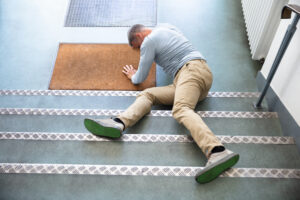<?xml encoding=”utf-8″ ?????????>
Slip and fall accidents can occur due to things like wet floors, uneven surfaces and poorly maintained stairways.
These accidents can result in a variety of injuries, from fractures, sprains and bruises to traumatic brain injuries. If you should experience a slip and fall accident, your first call of action should be to seek professional medical attention.
Once you have done that, if the accident happened on a company’s property, such as inside a store or in a carpark, you may be able to sue.
Here are four things you should know about suing a company if you have a slip and fall accident.
1. Companies Can Be Held Liable for Slip and Fall Accidents
In the United Kingdom, companies are bound by law to sustain safe environments for patrons, employees and anyone who engages with their premises. This involves consistent property inspections and displaying clear warnings in areas where hazards can occur.
If a person has a fall due to an ignored hazard or lack of signage, and that is the fault of the company, the company could be held liable.
In such situations, individuals have legal recourse to facilitate an action against the entity that may result in compensation for injuries sustained. Compensation could cover private medical bills and lost wages – due to the inability to work during the recovery period.
Additionally, a claim can sometimes include non-economic damages, which address not just the tangible losses but also the emotional distress and potential physical impairment or psychological trauma that arises from the slip and fall accident.
2. To Successfully Sue, the Company’s Negligence Must Be Proven
To effectively sue a company after a slip and fall incident, you must establish proof that suggests negligence on their part.
Documenting evidence like photos of the hazard without warning signs, accident reports, medical documents and testimonies from witnesses who were present during the accident will all bolster your claim significantly.
3. Personal Injury Laws Differ Around the World
Exploring personal injury laws globally reveals some striking differences across countries.
For instance, in the United Kingdom, the legal framework dictates that persons injured due to another’s negligence have three years from their date of knowledge about injury to file a claim.
Plus, the “no win, no fee” system ensures everyone has access to legal support regardless of economic standing.
Comparatively, personal injury law in the United States adopts a somewhat varied approach.
For instance, a Houston based personal injury lawyer would explain that Texas operates under a modified comparative fault rule, where victims may see reduced compensation if they bear some responsibility for their injuries.
Countries such as Germany employ stringent timelines much tighter than in the U.K. Victims only have six months to lodge claims following an accident.
Meanwhile in Canada, similar to U.K. laws, victims have up to two years to initiate proceedings but unlike the U.K., there is no “no win, no fee” scheme. Canadian litigants are economically liable for unsuccessful court actions.
Therefore, make sure you understand the legal situation concerning suing a company for a slip and fall accident in the country in which you reside. The best way to do that is to consult a local lawyer.
4. Engaging Legal Representation Will Increase Your Chances of Successfully Suing
The legal landscape surrounding personal injury cases can be intricate and overwhelming to navigate without expert guidance.
Therefore, securing an experienced solicitor who specialises in slip and fall incidents is strongly advised.
They can effectively evaluate your case’s strength, guide you through compiling a robust evidence portfolio, represent you during court proceedings and even negotiate better settlement terms.
Their involvement will elevate your chances of success significantly and ensure your rights are adequately protected throughout the process.
